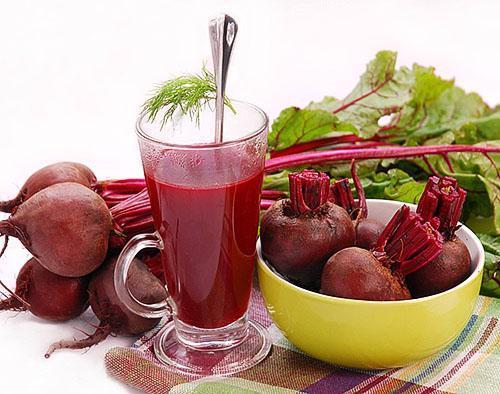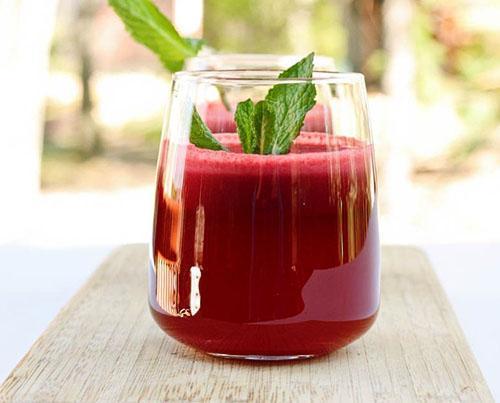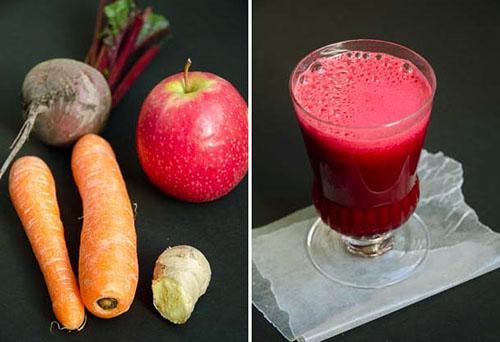The benefits and harms of beetroot juice
 Healers of Ancient China were the first to pay attention to the medicinal properties of beets and so far from the roots of this plant. The healing effects of beetroot juice are mentioned in the works of Hippocrates and other scientists of past eras.
Healers of Ancient China were the first to pay attention to the medicinal properties of beets and so far from the roots of this plant. The healing effects of beetroot juice are mentioned in the works of Hippocrates and other scientists of past eras.
Thanks to detailed studies of the chemical composition of root crops and the resulting juice, modern scientists have largely confirmed the achievements of traditional medicine and even expanded the sphere of influence of these useful natural products. What are the useful properties of the juice, are there any contraindications to its intake? And for what diseases will the drink bring the greatest benefit to human health?
Read also the article: beet juice benefits and harms!
Composition and useful properties of beet juice

- 83.4% moisture;
- 1% protein;
- 9.9% carbohydrates, most of which are mono- and disaccharides;
- 1% fiber;
- and also a small amount ash and organic acids.
The benefits and harms of beet juice are determined by all bioactive substances in its composition.
Since raw roots that have not been heat treated are used in the production of juice, almost all vitamins, macro- and microelements, as well as organic acids, pectins and anthocyanins are transferred to the medicinal drink.
Fresh juice contains many vitamins, including:
- vitamin B1 supporting the functioning of the nervous and digestive system;
- Vitamin B2, which controls human growth and reproductive capacity;
- vitamin B9, irreplaceable in the work of the hematopoietic and immune system;
- taking part in the synthesis of a number of hormones vitamin PP;
- counteracting infections, providing the body with energy and supporting the defenses ascorbic acid;
- Vitamin P, which responds to the elasticity and permeability of capillaries and vascular walls.
Beet juice contains a lot of plant proteins and amino acids. The product recommended by physicians for the treatment of a wide variety of diseases includes a wide range of mineral compounds.
 And if you drink beet juice correctly, the benefits of such a procedure will be maximum.
And if you drink beet juice correctly, the benefits of such a procedure will be maximum.
For example, iodine in beet juice is an indispensable element for the functioning of the endocrine system. Manganese, zinc and fluorine have a direct effect on metabolic processes, reproductive function and hematopoiesis. Potassium, which is extremely abundant in fresh burgundy juice, is a key element in protecting blood vessels and the heart in case of the risk of atherosclerosis, heart attacks and strokes.
An important role in the work of the cardiovascular system is played by anthocyanins that color beets in such a rich color.
These substances are able to normalize blood pressure, neutralize vascular spasms, resist the formation of cancer cells and protect the body from other negative influences. Pectins also have a protective effect, preventing heavy metals, radionuclides and harmful microorganisms from causing harm to humans.
 However, the beneficial properties of beetroot juice are not limited to this. A drink containing iron may have a beneficial effect on tissue oxygenation.In addition to iron, the quality of blood is affected by the sodium, magnesium and potassium present in the juice.
However, the beneficial properties of beetroot juice are not limited to this. A drink containing iron may have a beneficial effect on tissue oxygenation.In addition to iron, the quality of blood is affected by the sodium, magnesium and potassium present in the juice.
Useful properties of beet juice and contraindications for drinking
Since childhood, the majority of beet juice is well known as a folk remedy for the common cold, but the scope of the remedy is not limited to this.
 With a pronounced anti-inflammatory and disinfecting properties, the juice can be used for angina and other diseases accompanied by inflammatory processes.
With a pronounced anti-inflammatory and disinfecting properties, the juice can be used for angina and other diseases accompanied by inflammatory processes.
If for colds juice beets used for rinsing and nasal drops, then for the treatment of bruises, abrasions and superficial wounds, including pustular foci and abscesses, use lotions and compresses with liquid. In this case, beet juice exhibits not only anti-inflammatory, but also wound healing effect.
The vitamins in the drink are in an easily digestible form, so drinking beet juice is useful for vitamin deficiency, during exhausting physical and mental stress, after an illness, when the body most needs quick, effective support. If you drink beet juice correctly, a person's endurance will noticeably increase, sleep will normalize, anxiety and fatigue will disappear.
Beetroot juice helps to improve performance, improve memory and serves as an effective prevention of atherosclerosis.
Beetroot drink contributes to:
- thinning blood and its better flow;
- cleansing blood vessels from calcium deposits, which sometimes lead to heart attacks and strokes, clogged veins and exacerbations of varicose veins.
Drinking beet juice is also useful for anemia, hypertension, disorders of the liver and pancreas, gastrointestinal problems and oncological diseases.
 A low-calorie drink rich in vitamins and other essential substances for the body is useful for overweight, the need to remove toxins and toxins, thyroid disorders and many other dysfunctions. As a laxative, the juice helps facilitate bowel movements.
A low-calorie drink rich in vitamins and other essential substances for the body is useful for overweight, the need to remove toxins and toxins, thyroid disorders and many other dysfunctions. As a laxative, the juice helps facilitate bowel movements.
Women of childbearing and older age are aware of the ability of the drink to relieve cramps and improve well-being during menstruation and menopause.
True, when drinking the drink inside, it is important to take into account not only the beneficial properties of beet juice, but also contraindications.
This is especially true when the juice is taken by pregnant women. On the one hand, the vitamin and mineral composition of the drink can be of great help for a woman carrying a child. On the other hand, during pregnancy, beet juice is a risk factor due to possible allergic reactions and irritation of the intestinal mucosa.
When is beet juice not recommended?
 Pregnancy is not the only condition where juice intake should be taken with the utmost seriousness and caution.
Pregnancy is not the only condition where juice intake should be taken with the utmost seriousness and caution.
For example, the oxalic acid contained in the drink, when ingested, is capable of forming practically insoluble salts. As a result, sand or stones from such compounds cause real torment to people, and in comparison with the benefits, the harm of beetroot juice is much more significant.
Under what diagnoses is drinking beet juice not useful, but harmful? In addition to urolithiasis and other inflammatory diseases of the kidneys and ureters, a contraindication to taking a beetroot drink is considered:
- low pressure;
- increased acidity;
- diabetes mellitus and predisposition to this disease;
- gout and related joint lesions;
- a tendency to diarrhea.
Due to the activity of the drink, beetroot juice is not given to children, at least until the age of three.
 With regard to beet juice, some people have an individual intolerance, expressed in allergic reactions, digestive disorders, vomiting and other unpleasant symptoms.To avoid such negative consequences of the wellness procedure, it is important for even a healthy person to know how to properly prepare beet juice and drink this healthy drink.
With regard to beet juice, some people have an individual intolerance, expressed in allergic reactions, digestive disorders, vomiting and other unpleasant symptoms.To avoid such negative consequences of the wellness procedure, it is important for even a healthy person to know how to properly prepare beet juice and drink this healthy drink.
How to make beet juice?
The most beneficial is the juice obtained from intensely colored fresh root crops.
 Before pressing, the beets are thoroughly washed and coarse rhizomes and apices are removed. When the juice is ready, it is placed in the cold for a couple of hours, after which the foam formed on the surface is removed.
Before pressing, the beets are thoroughly washed and coarse rhizomes and apices are removed. When the juice is ready, it is placed in the cold for a couple of hours, after which the foam formed on the surface is removed.
If before drinking beet juice, do not keep it in the refrigerator, the already specific taste of the drink can cause unpleasant sensations. The product can retain its beneficial properties for up to 48 hours, but if the juice is pasteurized, the shelf life increases, but the benefits of the drink also decrease.
How to drink beet juice correctly?
Beet juice in its pure form, especially in a person who is not accustomed to its taste, can cause a lot of unpleasant emotions from dizziness to stomach cramps.
 Therefore, it is better to start drinking beet juice diluted with natural carrot, pumpkin or other juice. Most often, it is recommended to take three or four parts of a softer and more familiar drink for one part of beet juice, gradually increasing the proportion of healing beet juice.
Therefore, it is better to start drinking beet juice diluted with natural carrot, pumpkin or other juice. Most often, it is recommended to take three or four parts of a softer and more familiar drink for one part of beet juice, gradually increasing the proportion of healing beet juice.
A juice cocktail is taken twice a day in a glass, and you should not drink pure beet juice without a break for more than two weeks. After such a course, take a break for another 14 days, and then, if there are no unpleasant consequences, the juice is repeated.
Carrots, juicy pumpkins, peaches and apples are most often used as an addition to beets in a medicinal cocktail. A small amount of ginger, orange juice and berry fruit drinks give unusual notes to beet juice. Lovers of vegetable cocktails can add juice from tomatoes and cucumbers, celery stalks or spinach leaves to beetroot cocktails.